Legal and Ethical Decision Making in Patient-Centered Care
VerifiedAdded on 2022/11/13
|8
|2785
|298
AI Summary
This essay discusses legal and ethical decision making in patient-centered care with the help of evidence-based research. The case scenario of Taylah, a teenager seeking contraceptive pills, is used to apply the 4 principle framework suggested by Beauchamp and Childress.
Contribute Materials
Your contribution can guide someone’s learning journey. Share your
documents today.
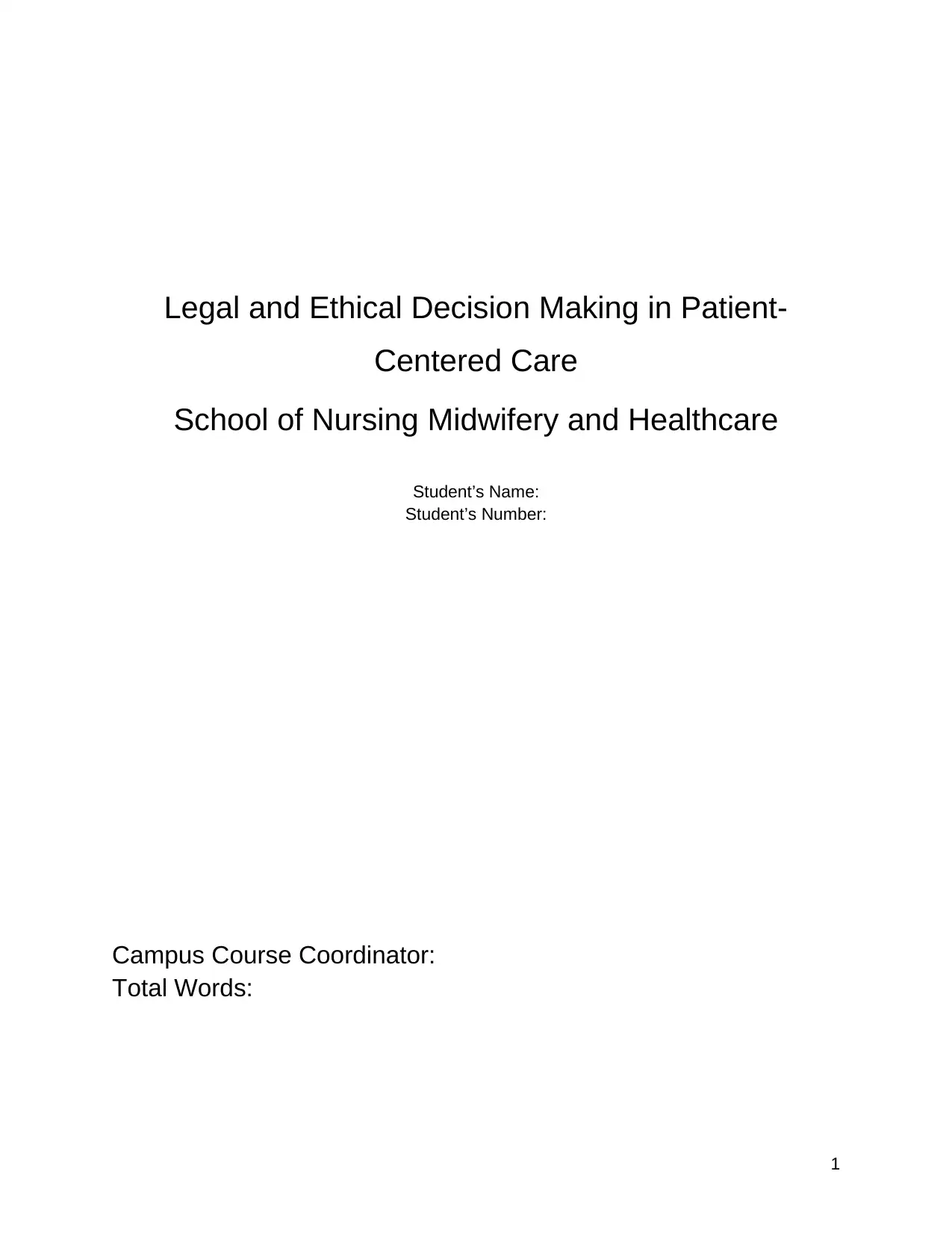
Legal and Ethical Decision Making in Patient-
Centered Care
School of Nursing Midwifery and Healthcare
Student’s Name:
Student’s Number:
Campus Course Coordinator:
Total Words:
1
Centered Care
School of Nursing Midwifery and Healthcare
Student’s Name:
Student’s Number:
Campus Course Coordinator:
Total Words:
1
Secure Best Marks with AI Grader
Need help grading? Try our AI Grader for instant feedback on your assignments.
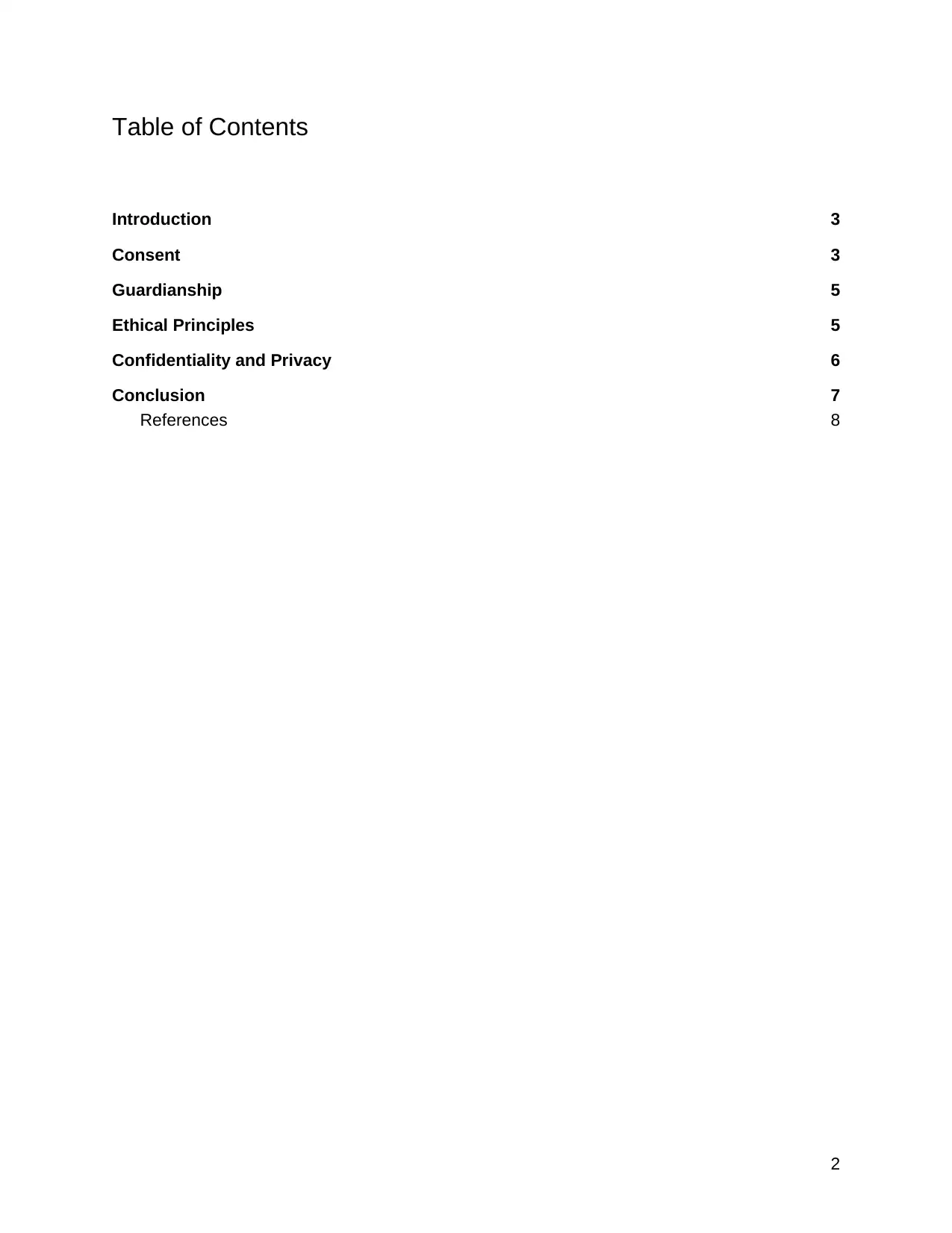
Table of Contents
Introduction 3
Consent 3
Guardianship 5
Ethical Principles 5
Confidentiality and Privacy 6
Conclusion 7
References 8
2
Introduction 3
Consent 3
Guardianship 5
Ethical Principles 5
Confidentiality and Privacy 6
Conclusion 7
References 8
2
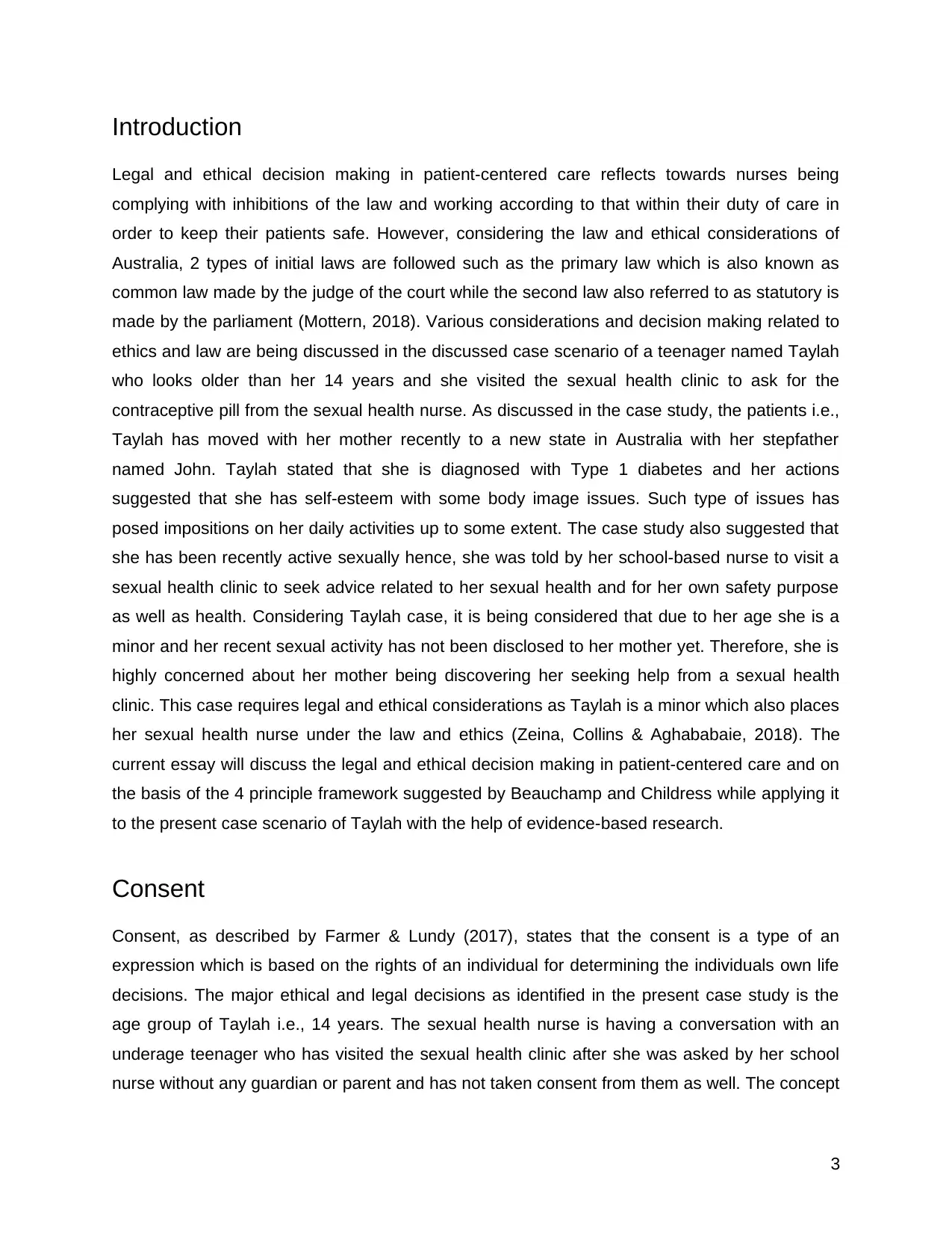
Introduction
Legal and ethical decision making in patient-centered care reflects towards nurses being
complying with inhibitions of the law and working according to that within their duty of care in
order to keep their patients safe. However, considering the law and ethical considerations of
Australia, 2 types of initial laws are followed such as the primary law which is also known as
common law made by the judge of the court while the second law also referred to as statutory is
made by the parliament (Mottern, 2018). Various considerations and decision making related to
ethics and law are being discussed in the discussed case scenario of a teenager named Taylah
who looks older than her 14 years and she visited the sexual health clinic to ask for the
contraceptive pill from the sexual health nurse. As discussed in the case study, the patients i.e.,
Taylah has moved with her mother recently to a new state in Australia with her stepfather
named John. Taylah stated that she is diagnosed with Type 1 diabetes and her actions
suggested that she has self-esteem with some body image issues. Such type of issues has
posed impositions on her daily activities up to some extent. The case study also suggested that
she has been recently active sexually hence, she was told by her school-based nurse to visit a
sexual health clinic to seek advice related to her sexual health and for her own safety purpose
as well as health. Considering Taylah case, it is being considered that due to her age she is a
minor and her recent sexual activity has not been disclosed to her mother yet. Therefore, she is
highly concerned about her mother being discovering her seeking help from a sexual health
clinic. This case requires legal and ethical considerations as Taylah is a minor which also places
her sexual health nurse under the law and ethics (Zeina, Collins & Aghababaie, 2018). The
current essay will discuss the legal and ethical decision making in patient-centered care and on
the basis of the 4 principle framework suggested by Beauchamp and Childress while applying it
to the present case scenario of Taylah with the help of evidence-based research.
Consent
Consent, as described by Farmer & Lundy (2017), states that the consent is a type of an
expression which is based on the rights of an individual for determining the individuals own life
decisions. The major ethical and legal decisions as identified in the present case study is the
age group of Taylah i.e., 14 years. The sexual health nurse is having a conversation with an
underage teenager who has visited the sexual health clinic after she was asked by her school
nurse without any guardian or parent and has not taken consent from them as well. The concept
3
Legal and ethical decision making in patient-centered care reflects towards nurses being
complying with inhibitions of the law and working according to that within their duty of care in
order to keep their patients safe. However, considering the law and ethical considerations of
Australia, 2 types of initial laws are followed such as the primary law which is also known as
common law made by the judge of the court while the second law also referred to as statutory is
made by the parliament (Mottern, 2018). Various considerations and decision making related to
ethics and law are being discussed in the discussed case scenario of a teenager named Taylah
who looks older than her 14 years and she visited the sexual health clinic to ask for the
contraceptive pill from the sexual health nurse. As discussed in the case study, the patients i.e.,
Taylah has moved with her mother recently to a new state in Australia with her stepfather
named John. Taylah stated that she is diagnosed with Type 1 diabetes and her actions
suggested that she has self-esteem with some body image issues. Such type of issues has
posed impositions on her daily activities up to some extent. The case study also suggested that
she has been recently active sexually hence, she was told by her school-based nurse to visit a
sexual health clinic to seek advice related to her sexual health and for her own safety purpose
as well as health. Considering Taylah case, it is being considered that due to her age she is a
minor and her recent sexual activity has not been disclosed to her mother yet. Therefore, she is
highly concerned about her mother being discovering her seeking help from a sexual health
clinic. This case requires legal and ethical considerations as Taylah is a minor which also places
her sexual health nurse under the law and ethics (Zeina, Collins & Aghababaie, 2018). The
current essay will discuss the legal and ethical decision making in patient-centered care and on
the basis of the 4 principle framework suggested by Beauchamp and Childress while applying it
to the present case scenario of Taylah with the help of evidence-based research.
Consent
Consent, as described by Farmer & Lundy (2017), states that the consent is a type of an
expression which is based on the rights of an individual for determining the individuals own life
decisions. The major ethical and legal decisions as identified in the present case study is the
age group of Taylah i.e., 14 years. The sexual health nurse is having a conversation with an
underage teenager who has visited the sexual health clinic after she was asked by her school
nurse without any guardian or parent and has not taken consent from them as well. The concept
3
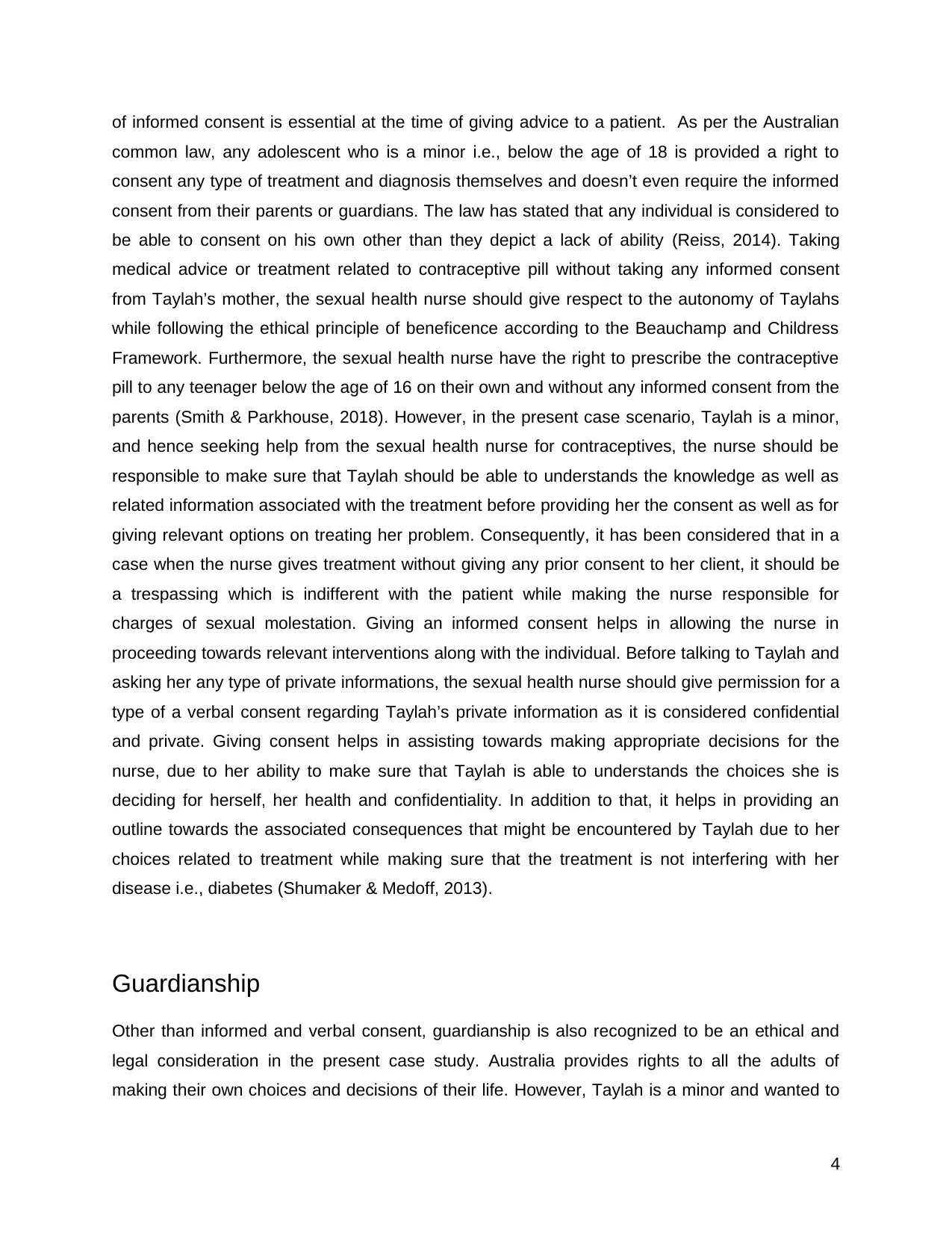
of informed consent is essential at the time of giving advice to a patient. As per the Australian
common law, any adolescent who is a minor i.e., below the age of 18 is provided a right to
consent any type of treatment and diagnosis themselves and doesn’t even require the informed
consent from their parents or guardians. The law has stated that any individual is considered to
be able to consent on his own other than they depict a lack of ability (Reiss, 2014). Taking
medical advice or treatment related to contraceptive pill without taking any informed consent
from Taylah’s mother, the sexual health nurse should give respect to the autonomy of Taylahs
while following the ethical principle of beneficence according to the Beauchamp and Childress
Framework. Furthermore, the sexual health nurse have the right to prescribe the contraceptive
pill to any teenager below the age of 16 on their own and without any informed consent from the
parents (Smith & Parkhouse, 2018). However, in the present case scenario, Taylah is a minor,
and hence seeking help from the sexual health nurse for contraceptives, the nurse should be
responsible to make sure that Taylah should be able to understands the knowledge as well as
related information associated with the treatment before providing her the consent as well as for
giving relevant options on treating her problem. Consequently, it has been considered that in a
case when the nurse gives treatment without giving any prior consent to her client, it should be
a trespassing which is indifferent with the patient while making the nurse responsible for
charges of sexual molestation. Giving an informed consent helps in allowing the nurse in
proceeding towards relevant interventions along with the individual. Before talking to Taylah and
asking her any type of private informations, the sexual health nurse should give permission for a
type of a verbal consent regarding Taylah’s private information as it is considered confidential
and private. Giving consent helps in assisting towards making appropriate decisions for the
nurse, due to her ability to make sure that Taylah is able to understands the choices she is
deciding for herself, her health and confidentiality. In addition to that, it helps in providing an
outline towards the associated consequences that might be encountered by Taylah due to her
choices related to treatment while making sure that the treatment is not interfering with her
disease i.e., diabetes (Shumaker & Medoff, 2013).
Guardianship
Other than informed and verbal consent, guardianship is also recognized to be an ethical and
legal consideration in the present case study. Australia provides rights to all the adults of
making their own choices and decisions of their life. However, Taylah is a minor and wanted to
4
common law, any adolescent who is a minor i.e., below the age of 18 is provided a right to
consent any type of treatment and diagnosis themselves and doesn’t even require the informed
consent from their parents or guardians. The law has stated that any individual is considered to
be able to consent on his own other than they depict a lack of ability (Reiss, 2014). Taking
medical advice or treatment related to contraceptive pill without taking any informed consent
from Taylah’s mother, the sexual health nurse should give respect to the autonomy of Taylahs
while following the ethical principle of beneficence according to the Beauchamp and Childress
Framework. Furthermore, the sexual health nurse have the right to prescribe the contraceptive
pill to any teenager below the age of 16 on their own and without any informed consent from the
parents (Smith & Parkhouse, 2018). However, in the present case scenario, Taylah is a minor,
and hence seeking help from the sexual health nurse for contraceptives, the nurse should be
responsible to make sure that Taylah should be able to understands the knowledge as well as
related information associated with the treatment before providing her the consent as well as for
giving relevant options on treating her problem. Consequently, it has been considered that in a
case when the nurse gives treatment without giving any prior consent to her client, it should be
a trespassing which is indifferent with the patient while making the nurse responsible for
charges of sexual molestation. Giving an informed consent helps in allowing the nurse in
proceeding towards relevant interventions along with the individual. Before talking to Taylah and
asking her any type of private informations, the sexual health nurse should give permission for a
type of a verbal consent regarding Taylah’s private information as it is considered confidential
and private. Giving consent helps in assisting towards making appropriate decisions for the
nurse, due to her ability to make sure that Taylah is able to understands the choices she is
deciding for herself, her health and confidentiality. In addition to that, it helps in providing an
outline towards the associated consequences that might be encountered by Taylah due to her
choices related to treatment while making sure that the treatment is not interfering with her
disease i.e., diabetes (Shumaker & Medoff, 2013).
Guardianship
Other than informed and verbal consent, guardianship is also recognized to be an ethical and
legal consideration in the present case study. Australia provides rights to all the adults of
making their own choices and decisions of their life. However, Taylah is a minor and wanted to
4
Secure Best Marks with AI Grader
Need help grading? Try our AI Grader for instant feedback on your assignments.
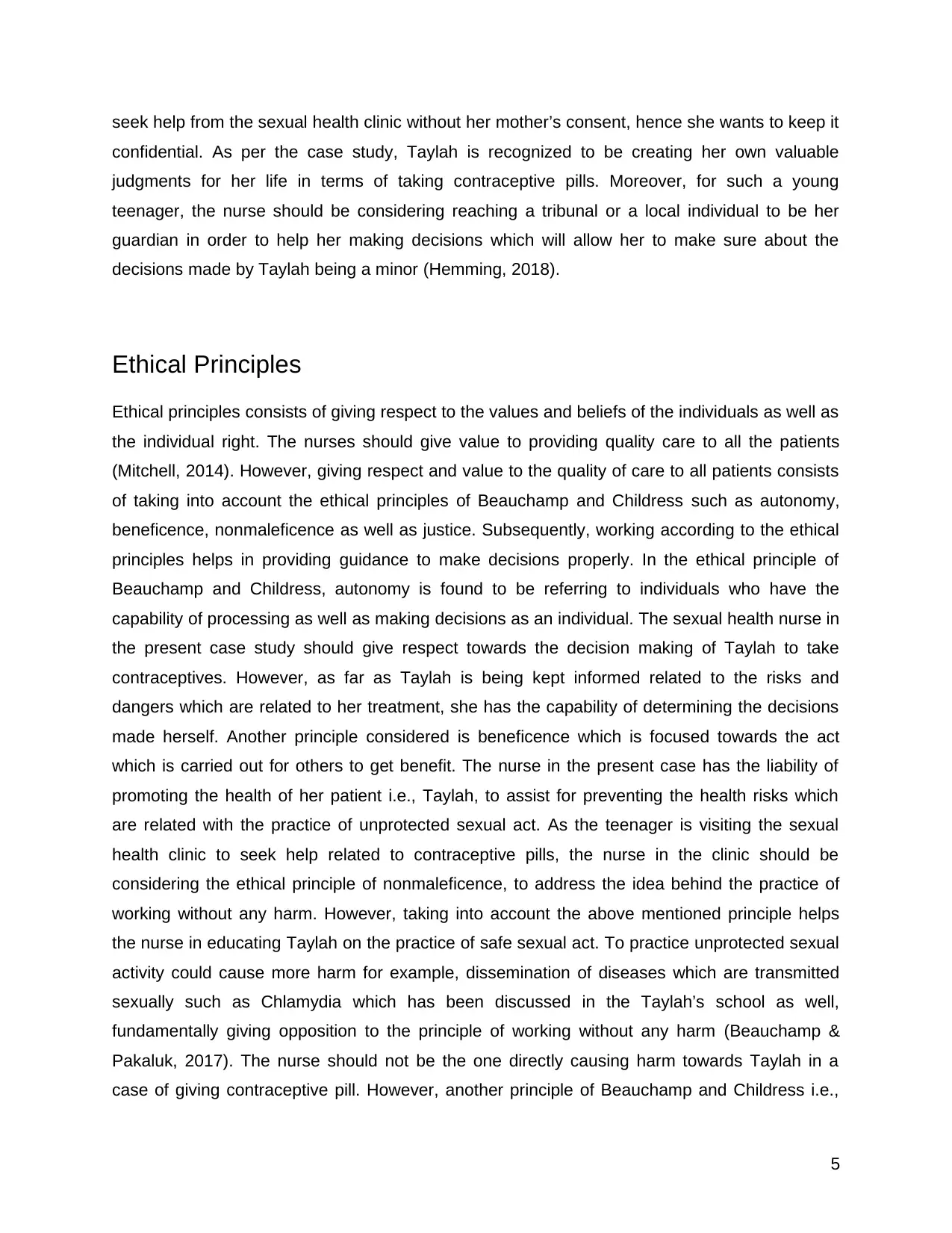
seek help from the sexual health clinic without her mother’s consent, hence she wants to keep it
confidential. As per the case study, Taylah is recognized to be creating her own valuable
judgments for her life in terms of taking contraceptive pills. Moreover, for such a young
teenager, the nurse should be considering reaching a tribunal or a local individual to be her
guardian in order to help her making decisions which will allow her to make sure about the
decisions made by Taylah being a minor (Hemming, 2018).
Ethical Principles
Ethical principles consists of giving respect to the values and beliefs of the individuals as well as
the individual right. The nurses should give value to providing quality care to all the patients
(Mitchell, 2014). However, giving respect and value to the quality of care to all patients consists
of taking into account the ethical principles of Beauchamp and Childress such as autonomy,
beneficence, nonmaleficence as well as justice. Subsequently, working according to the ethical
principles helps in providing guidance to make decisions properly. In the ethical principle of
Beauchamp and Childress, autonomy is found to be referring to individuals who have the
capability of processing as well as making decisions as an individual. The sexual health nurse in
the present case study should give respect towards the decision making of Taylah to take
contraceptives. However, as far as Taylah is being kept informed related to the risks and
dangers which are related to her treatment, she has the capability of determining the decisions
made herself. Another principle considered is beneficence which is focused towards the act
which is carried out for others to get benefit. The nurse in the present case has the liability of
promoting the health of her patient i.e., Taylah, to assist for preventing the health risks which
are related with the practice of unprotected sexual act. As the teenager is visiting the sexual
health clinic to seek help related to contraceptive pills, the nurse in the clinic should be
considering the ethical principle of nonmaleficence, to address the idea behind the practice of
working without any harm. However, taking into account the above mentioned principle helps
the nurse in educating Taylah on the practice of safe sexual act. To practice unprotected sexual
activity could cause more harm for example, dissemination of diseases which are transmitted
sexually such as Chlamydia which has been discussed in the Taylah’s school as well,
fundamentally giving opposition to the principle of working without any harm (Beauchamp &
Pakaluk, 2017). The nurse should not be the one directly causing harm towards Taylah in a
case of giving contraceptive pill. However, another principle of Beauchamp and Childress i.e.,
5
confidential. As per the case study, Taylah is recognized to be creating her own valuable
judgments for her life in terms of taking contraceptive pills. Moreover, for such a young
teenager, the nurse should be considering reaching a tribunal or a local individual to be her
guardian in order to help her making decisions which will allow her to make sure about the
decisions made by Taylah being a minor (Hemming, 2018).
Ethical Principles
Ethical principles consists of giving respect to the values and beliefs of the individuals as well as
the individual right. The nurses should give value to providing quality care to all the patients
(Mitchell, 2014). However, giving respect and value to the quality of care to all patients consists
of taking into account the ethical principles of Beauchamp and Childress such as autonomy,
beneficence, nonmaleficence as well as justice. Subsequently, working according to the ethical
principles helps in providing guidance to make decisions properly. In the ethical principle of
Beauchamp and Childress, autonomy is found to be referring to individuals who have the
capability of processing as well as making decisions as an individual. The sexual health nurse in
the present case study should give respect towards the decision making of Taylah to take
contraceptives. However, as far as Taylah is being kept informed related to the risks and
dangers which are related to her treatment, she has the capability of determining the decisions
made herself. Another principle considered is beneficence which is focused towards the act
which is carried out for others to get benefit. The nurse in the present case has the liability of
promoting the health of her patient i.e., Taylah, to assist for preventing the health risks which
are related with the practice of unprotected sexual act. As the teenager is visiting the sexual
health clinic to seek help related to contraceptive pills, the nurse in the clinic should be
considering the ethical principle of nonmaleficence, to address the idea behind the practice of
working without any harm. However, taking into account the above mentioned principle helps
the nurse in educating Taylah on the practice of safe sexual act. To practice unprotected sexual
activity could cause more harm for example, dissemination of diseases which are transmitted
sexually such as Chlamydia which has been discussed in the Taylah’s school as well,
fundamentally giving opposition to the principle of working without any harm (Beauchamp &
Pakaluk, 2017). The nurse should not be the one directly causing harm towards Taylah in a
case of giving contraceptive pill. However, another principle of Beauchamp and Childress i.e.,
5
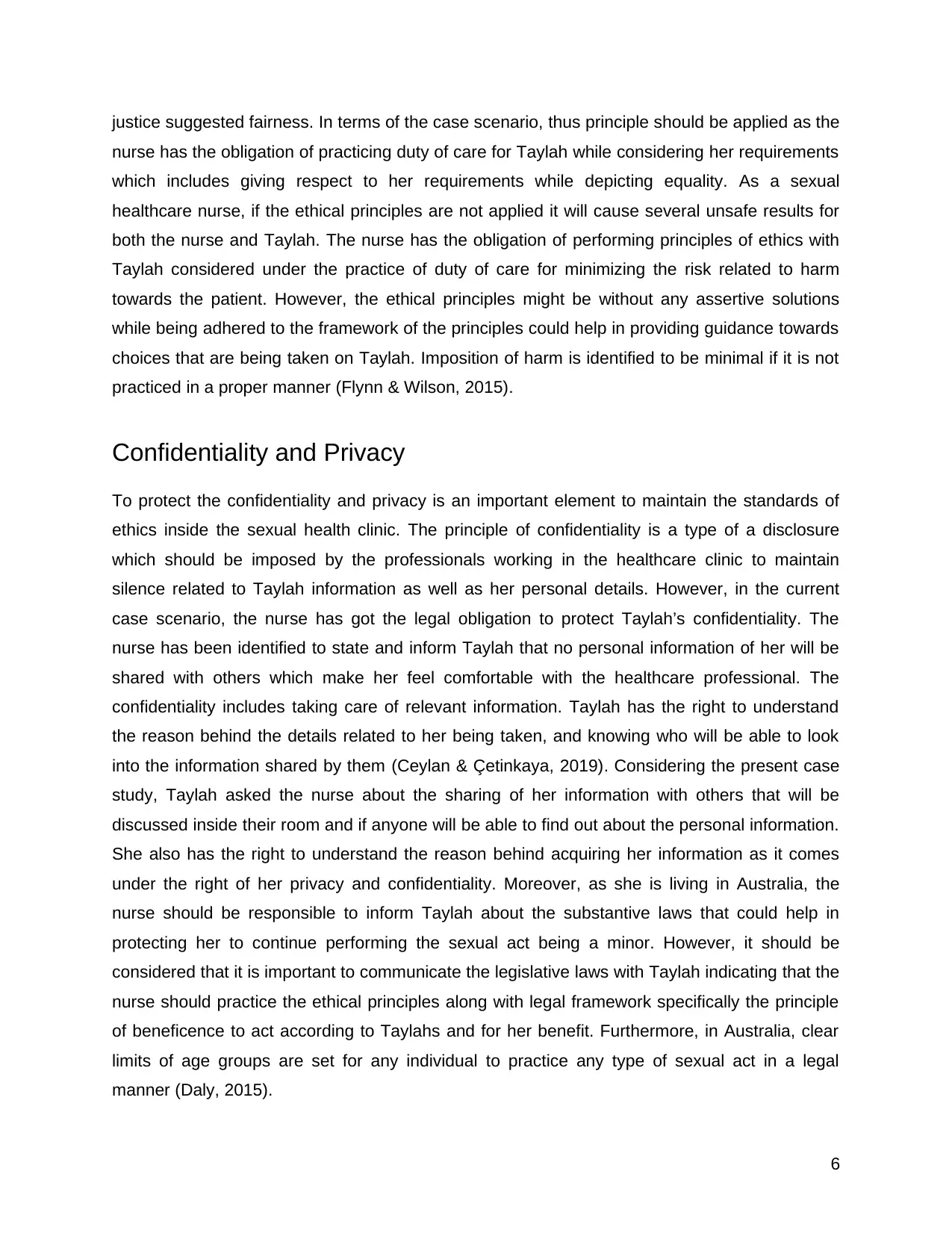
justice suggested fairness. In terms of the case scenario, thus principle should be applied as the
nurse has the obligation of practicing duty of care for Taylah while considering her requirements
which includes giving respect to her requirements while depicting equality. As a sexual
healthcare nurse, if the ethical principles are not applied it will cause several unsafe results for
both the nurse and Taylah. The nurse has the obligation of performing principles of ethics with
Taylah considered under the practice of duty of care for minimizing the risk related to harm
towards the patient. However, the ethical principles might be without any assertive solutions
while being adhered to the framework of the principles could help in providing guidance towards
choices that are being taken on Taylah. Imposition of harm is identified to be minimal if it is not
practiced in a proper manner (Flynn & Wilson, 2015).
Confidentiality and Privacy
To protect the confidentiality and privacy is an important element to maintain the standards of
ethics inside the sexual health clinic. The principle of confidentiality is a type of a disclosure
which should be imposed by the professionals working in the healthcare clinic to maintain
silence related to Taylah information as well as her personal details. However, in the current
case scenario, the nurse has got the legal obligation to protect Taylah’s confidentiality. The
nurse has been identified to state and inform Taylah that no personal information of her will be
shared with others which make her feel comfortable with the healthcare professional. The
confidentiality includes taking care of relevant information. Taylah has the right to understand
the reason behind the details related to her being taken, and knowing who will be able to look
into the information shared by them (Ceylan & Çetinkaya, 2019). Considering the present case
study, Taylah asked the nurse about the sharing of her information with others that will be
discussed inside their room and if anyone will be able to find out about the personal information.
She also has the right to understand the reason behind acquiring her information as it comes
under the right of her privacy and confidentiality. Moreover, as she is living in Australia, the
nurse should be responsible to inform Taylah about the substantive laws that could help in
protecting her to continue performing the sexual act being a minor. However, it should be
considered that it is important to communicate the legislative laws with Taylah indicating that the
nurse should practice the ethical principles along with legal framework specifically the principle
of beneficence to act according to Taylahs and for her benefit. Furthermore, in Australia, clear
limits of age groups are set for any individual to practice any type of sexual act in a legal
manner (Daly, 2015).
6
nurse has the obligation of practicing duty of care for Taylah while considering her requirements
which includes giving respect to her requirements while depicting equality. As a sexual
healthcare nurse, if the ethical principles are not applied it will cause several unsafe results for
both the nurse and Taylah. The nurse has the obligation of performing principles of ethics with
Taylah considered under the practice of duty of care for minimizing the risk related to harm
towards the patient. However, the ethical principles might be without any assertive solutions
while being adhered to the framework of the principles could help in providing guidance towards
choices that are being taken on Taylah. Imposition of harm is identified to be minimal if it is not
practiced in a proper manner (Flynn & Wilson, 2015).
Confidentiality and Privacy
To protect the confidentiality and privacy is an important element to maintain the standards of
ethics inside the sexual health clinic. The principle of confidentiality is a type of a disclosure
which should be imposed by the professionals working in the healthcare clinic to maintain
silence related to Taylah information as well as her personal details. However, in the current
case scenario, the nurse has got the legal obligation to protect Taylah’s confidentiality. The
nurse has been identified to state and inform Taylah that no personal information of her will be
shared with others which make her feel comfortable with the healthcare professional. The
confidentiality includes taking care of relevant information. Taylah has the right to understand
the reason behind the details related to her being taken, and knowing who will be able to look
into the information shared by them (Ceylan & Çetinkaya, 2019). Considering the present case
study, Taylah asked the nurse about the sharing of her information with others that will be
discussed inside their room and if anyone will be able to find out about the personal information.
She also has the right to understand the reason behind acquiring her information as it comes
under the right of her privacy and confidentiality. Moreover, as she is living in Australia, the
nurse should be responsible to inform Taylah about the substantive laws that could help in
protecting her to continue performing the sexual act being a minor. However, it should be
considered that it is important to communicate the legislative laws with Taylah indicating that the
nurse should practice the ethical principles along with legal framework specifically the principle
of beneficence to act according to Taylahs and for her benefit. Furthermore, in Australia, clear
limits of age groups are set for any individual to practice any type of sexual act in a legal
manner (Daly, 2015).
6
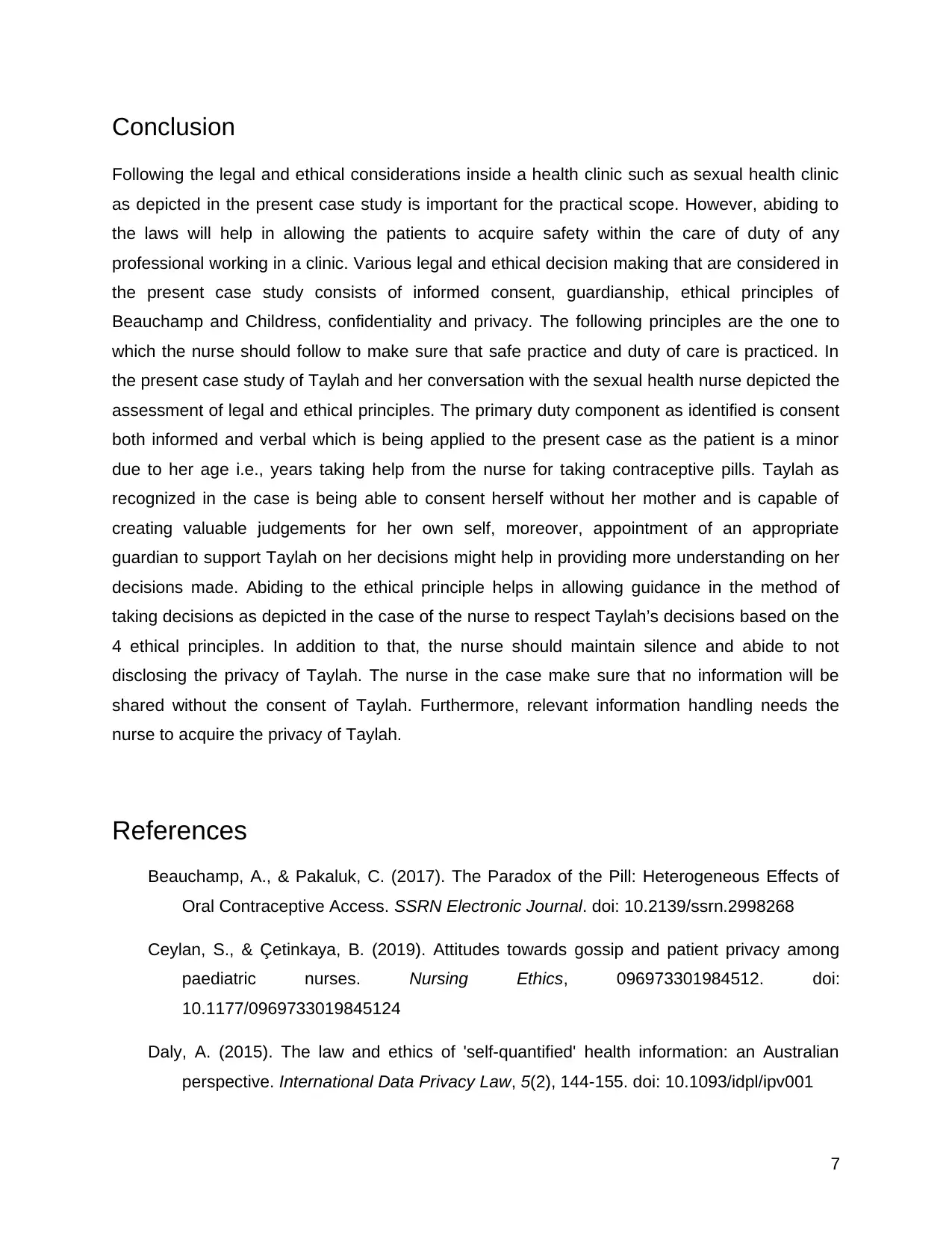
Conclusion
Following the legal and ethical considerations inside a health clinic such as sexual health clinic
as depicted in the present case study is important for the practical scope. However, abiding to
the laws will help in allowing the patients to acquire safety within the care of duty of any
professional working in a clinic. Various legal and ethical decision making that are considered in
the present case study consists of informed consent, guardianship, ethical principles of
Beauchamp and Childress, confidentiality and privacy. The following principles are the one to
which the nurse should follow to make sure that safe practice and duty of care is practiced. In
the present case study of Taylah and her conversation with the sexual health nurse depicted the
assessment of legal and ethical principles. The primary duty component as identified is consent
both informed and verbal which is being applied to the present case as the patient is a minor
due to her age i.e., years taking help from the nurse for taking contraceptive pills. Taylah as
recognized in the case is being able to consent herself without her mother and is capable of
creating valuable judgements for her own self, moreover, appointment of an appropriate
guardian to support Taylah on her decisions might help in providing more understanding on her
decisions made. Abiding to the ethical principle helps in allowing guidance in the method of
taking decisions as depicted in the case of the nurse to respect Taylah’s decisions based on the
4 ethical principles. In addition to that, the nurse should maintain silence and abide to not
disclosing the privacy of Taylah. The nurse in the case make sure that no information will be
shared without the consent of Taylah. Furthermore, relevant information handling needs the
nurse to acquire the privacy of Taylah.
References
Beauchamp, A., & Pakaluk, C. (2017). The Paradox of the Pill: Heterogeneous Effects of
Oral Contraceptive Access. SSRN Electronic Journal. doi: 10.2139/ssrn.2998268
Ceylan, S., & Çetinkaya, B. (2019). Attitudes towards gossip and patient privacy among
paediatric nurses. Nursing Ethics, 096973301984512. doi:
10.1177/0969733019845124
Daly, A. (2015). The law and ethics of 'self-quantified' health information: an Australian
perspective. International Data Privacy Law, 5(2), 144-155. doi: 10.1093/idpl/ipv001
7
Following the legal and ethical considerations inside a health clinic such as sexual health clinic
as depicted in the present case study is important for the practical scope. However, abiding to
the laws will help in allowing the patients to acquire safety within the care of duty of any
professional working in a clinic. Various legal and ethical decision making that are considered in
the present case study consists of informed consent, guardianship, ethical principles of
Beauchamp and Childress, confidentiality and privacy. The following principles are the one to
which the nurse should follow to make sure that safe practice and duty of care is practiced. In
the present case study of Taylah and her conversation with the sexual health nurse depicted the
assessment of legal and ethical principles. The primary duty component as identified is consent
both informed and verbal which is being applied to the present case as the patient is a minor
due to her age i.e., years taking help from the nurse for taking contraceptive pills. Taylah as
recognized in the case is being able to consent herself without her mother and is capable of
creating valuable judgements for her own self, moreover, appointment of an appropriate
guardian to support Taylah on her decisions might help in providing more understanding on her
decisions made. Abiding to the ethical principle helps in allowing guidance in the method of
taking decisions as depicted in the case of the nurse to respect Taylah’s decisions based on the
4 ethical principles. In addition to that, the nurse should maintain silence and abide to not
disclosing the privacy of Taylah. The nurse in the case make sure that no information will be
shared without the consent of Taylah. Furthermore, relevant information handling needs the
nurse to acquire the privacy of Taylah.
References
Beauchamp, A., & Pakaluk, C. (2017). The Paradox of the Pill: Heterogeneous Effects of
Oral Contraceptive Access. SSRN Electronic Journal. doi: 10.2139/ssrn.2998268
Ceylan, S., & Çetinkaya, B. (2019). Attitudes towards gossip and patient privacy among
paediatric nurses. Nursing Ethics, 096973301984512. doi:
10.1177/0969733019845124
Daly, A. (2015). The law and ethics of 'self-quantified' health information: an Australian
perspective. International Data Privacy Law, 5(2), 144-155. doi: 10.1093/idpl/ipv001
7
Paraphrase This Document
Need a fresh take? Get an instant paraphrase of this document with our AI Paraphraser
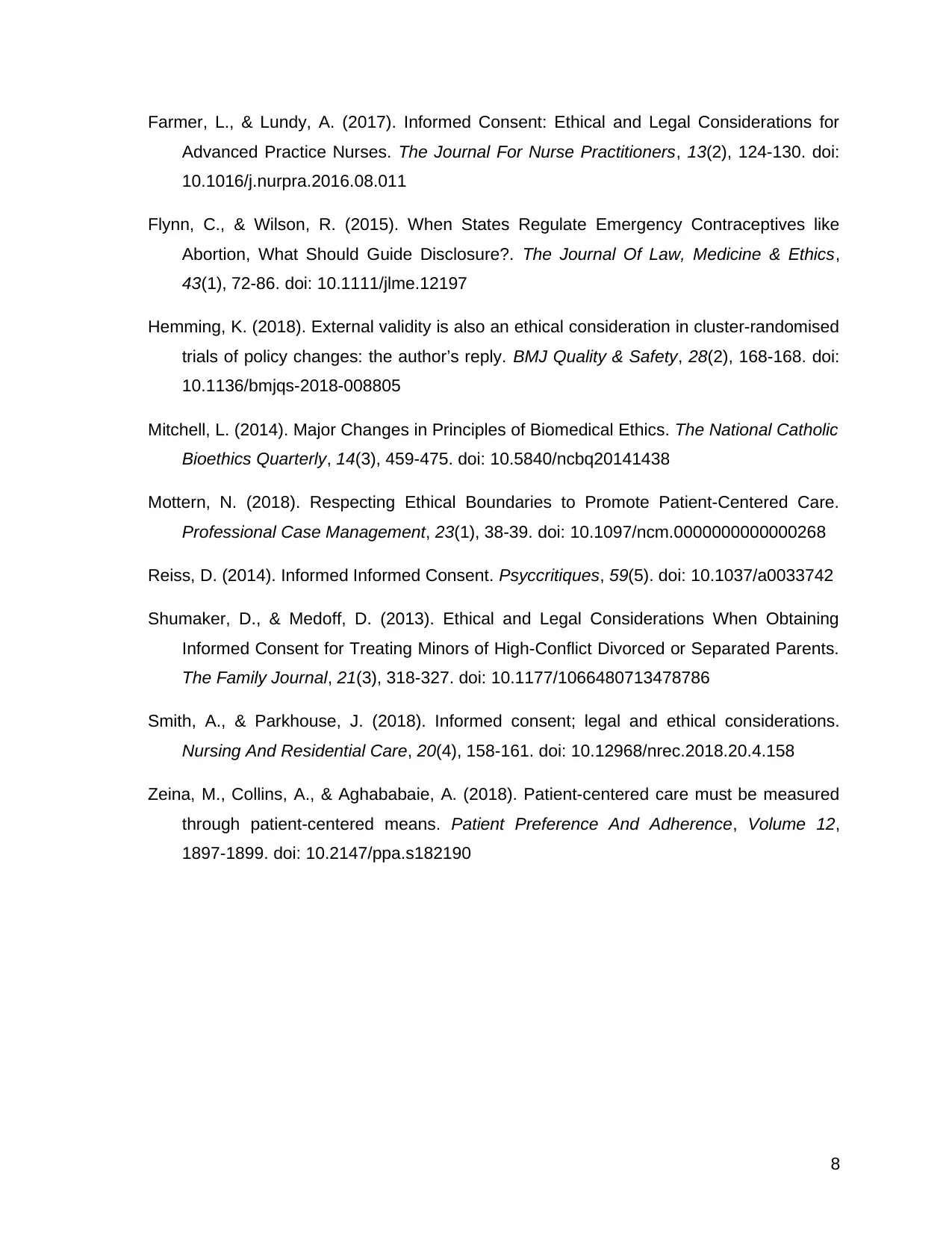
Farmer, L., & Lundy, A. (2017). Informed Consent: Ethical and Legal Considerations for
Advanced Practice Nurses. The Journal For Nurse Practitioners, 13(2), 124-130. doi:
10.1016/j.nurpra.2016.08.011
Flynn, C., & Wilson, R. (2015). When States Regulate Emergency Contraceptives like
Abortion, What Should Guide Disclosure?. The Journal Of Law, Medicine & Ethics,
43(1), 72-86. doi: 10.1111/jlme.12197
Hemming, K. (2018). External validity is also an ethical consideration in cluster-randomised
trials of policy changes: the author’s reply. BMJ Quality & Safety, 28(2), 168-168. doi:
10.1136/bmjqs-2018-008805
Mitchell, L. (2014). Major Changes in Principles of Biomedical Ethics. The National Catholic
Bioethics Quarterly, 14(3), 459-475. doi: 10.5840/ncbq20141438
Mottern, N. (2018). Respecting Ethical Boundaries to Promote Patient-Centered Care.
Professional Case Management, 23(1), 38-39. doi: 10.1097/ncm.0000000000000268
Reiss, D. (2014). Informed Informed Consent. Psyccritiques, 59(5). doi: 10.1037/a0033742
Shumaker, D., & Medoff, D. (2013). Ethical and Legal Considerations When Obtaining
Informed Consent for Treating Minors of High-Conflict Divorced or Separated Parents.
The Family Journal, 21(3), 318-327. doi: 10.1177/1066480713478786
Smith, A., & Parkhouse, J. (2018). Informed consent; legal and ethical considerations.
Nursing And Residential Care, 20(4), 158-161. doi: 10.12968/nrec.2018.20.4.158
Zeina, M., Collins, A., & Aghababaie, A. (2018). Patient-centered care must be measured
through patient-centered means. Patient Preference And Adherence, Volume 12,
1897-1899. doi: 10.2147/ppa.s182190
8
Advanced Practice Nurses. The Journal For Nurse Practitioners, 13(2), 124-130. doi:
10.1016/j.nurpra.2016.08.011
Flynn, C., & Wilson, R. (2015). When States Regulate Emergency Contraceptives like
Abortion, What Should Guide Disclosure?. The Journal Of Law, Medicine & Ethics,
43(1), 72-86. doi: 10.1111/jlme.12197
Hemming, K. (2018). External validity is also an ethical consideration in cluster-randomised
trials of policy changes: the author’s reply. BMJ Quality & Safety, 28(2), 168-168. doi:
10.1136/bmjqs-2018-008805
Mitchell, L. (2014). Major Changes in Principles of Biomedical Ethics. The National Catholic
Bioethics Quarterly, 14(3), 459-475. doi: 10.5840/ncbq20141438
Mottern, N. (2018). Respecting Ethical Boundaries to Promote Patient-Centered Care.
Professional Case Management, 23(1), 38-39. doi: 10.1097/ncm.0000000000000268
Reiss, D. (2014). Informed Informed Consent. Psyccritiques, 59(5). doi: 10.1037/a0033742
Shumaker, D., & Medoff, D. (2013). Ethical and Legal Considerations When Obtaining
Informed Consent for Treating Minors of High-Conflict Divorced or Separated Parents.
The Family Journal, 21(3), 318-327. doi: 10.1177/1066480713478786
Smith, A., & Parkhouse, J. (2018). Informed consent; legal and ethical considerations.
Nursing And Residential Care, 20(4), 158-161. doi: 10.12968/nrec.2018.20.4.158
Zeina, M., Collins, A., & Aghababaie, A. (2018). Patient-centered care must be measured
through patient-centered means. Patient Preference And Adherence, Volume 12,
1897-1899. doi: 10.2147/ppa.s182190
8
1 out of 8
Related Documents
Your All-in-One AI-Powered Toolkit for Academic Success.
+13062052269
info@desklib.com
Available 24*7 on WhatsApp / Email
![[object Object]](/_next/static/media/star-bottom.7253800d.svg)
Unlock your academic potential
© 2024 | Zucol Services PVT LTD | All rights reserved.





